Overview
Service businesses are organizations that provide intangible offerings, primarily assistance and expertise, to clients in exchange for compensation. This distinction from product-oriented companies highlights a unique set of challenges. The importance of client satisfaction and operational efficiency cannot be overstated; these elements are vital for success.
However, many service businesses struggle with effective service delivery, often feeling overwhelmed. It is crucial to understand that technology integration and a deep understanding of customer needs can significantly alleviate these challenges.
By embracing these solutions, businesses can foster growth and enhance their competitiveness in the service sector. Remember, addressing these issues not only benefits the organization but also nurtures the client relationship, paving the way for lasting success.
Introduction
In the ever-evolving landscape of service businesses, the ability to adapt and thrive amid unique challenges is crucial. These enterprises, characterized by their provision of intangible products and services, often grapple with complexities like:
- Scheduling inefficiencies
- Communication hurdles
- The pressing need for exceptional customer satisfaction
As technology transforms this environment, tools such as Field Complete stand out as essential partners, helping to streamline operations and enhance client interactions. By focusing on the specific needs of contractors, this article explores the characteristics, challenges, and innovative solutions that define successful service businesses today. It highlights the transformative power of effective management software, which plays a vital role in fostering growth and operational efficiency, ultimately supporting contractors in overcoming their obstacles and achieving their goals.
Defining Service Businesses: An Overview
A service business definition highlights that a service-oriented enterprise is an organization providing intangible offerings, primarily assistance, to clients in exchange for compensation. Unlike product-oriented companies that focus on tangible items, businesses delivering expertise, labor, or professional services emphasize the delivery of skills. This distinction is vital as it shapes the operational strategies and client interactions unique to the service business definition.
For instance, a plumbing company not only provides the technical skills necessary to resolve plumbing issues but also delivers a level of support that is essential for client satisfaction. Indeed, studies reveal that over 50 percent of clients will seek a competitor after a single unsatisfactory experience, underscoring the importance of effective support.
The definition of business operations has transformed, particularly in 2025, where technology integration plays a significant role. High-performing organizations increasingly embrace self-service options, with research indicating that 61% of users prefer these solutions for resolving straightforward issues. This shift not only enhances client satisfaction but also allows support agents to focus on more complex problems, thereby improving overall quality.
By introducing efficient self-service alternatives, organizations empower agents to concentrate on intricate challenges, resulting in superior quality and an enriched client experience.
Moreover, a remarkable 79% of clients are willing to share information to receive better experiences, emphasizing the necessity of understanding client needs within the industry. Successful enterprises harness this data to refine their offerings and enhance customer interactions. As Ashley Malsbury, Community Happiness Systems Manager, remarked, the capability to implement technology solutions without extensive developer support is crucial for enhancing delivery.
Field Total exemplifies how dedicated support packages can significantly enhance business operations for contractors. With a dedicated support agent, users can navigate challenges effectively, ensuring prompt and efficient issue resolution. Additionally, comprehensive account setup and training offerings empower contractors to maximize the software’s potential, streamlining scheduling, estimating, and payment collection processes.
Matthew Miller, CEO of OnSite Mastery, shares his perspective: “As the CEO of OnSite Mastery, I am proud to share our success story with Field Total software. It elevated our field ops, but implementation required more than just purchasing it. That’s where the success team made a difference, providing thorough training and data-driven insights that led to improved performance and growth.”
Furthermore, we have a dedicated support manager. I wholeheartedly recommend Field Complete and its support team for optimizing field operations and achieving better outcomes.
In summary, defining enterprises involves recognizing their unique characteristics and the evolving environment in which they operate. By prioritizing client satisfaction and operational efficiency, enterprises can thrive in a competitive market, as illustrated by numerous case studies showcasing effective strategies and growth in this sector. Platforms like Field Complete enhance operational efficiency and empower contractors to accomplish more tasks per technician, driving revenue growth and improving service delivery.
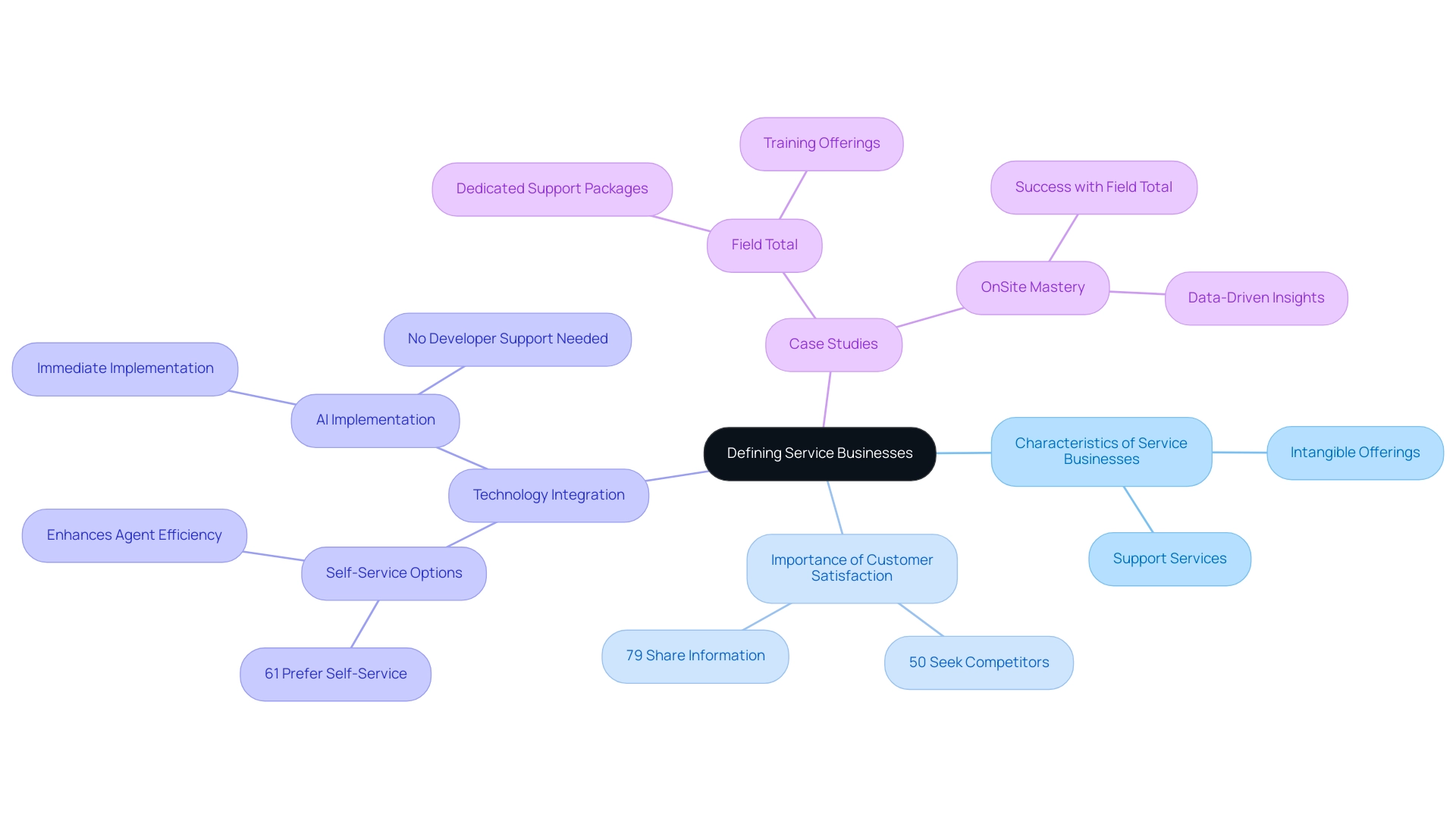
Key Characteristics of Service Businesses
The characteristics that define a service business—intangibility, inseparability, perishability, and variability—pose significant challenges for HVAC contractors, impacting their ability to deliver quality service. Intangibility, for instance, means that offerings cannot be physically observed or touched before acquisition, complicating clients’ ability to evaluate quality. This is particularly concerning, as over 50% of clients will transition to a competitor after just one unsatisfactory encounter. Quality is not just important; it is vital for success.
Field Complete’s contractor management software addresses this challenge by securely storing every record and detail about clients, projects, jobs, and work orders in one centralized database. This allows HVAC contractors to maintain high quality and client satisfaction. Moreover, contractors can upload and attach documents and PDFs to projects and jobs, further enhancing their organizational capabilities.
Inseparability, another key aspect of the service business definition, suggests that offerings are generally produced and consumed simultaneously, necessitating direct interaction between providers and clients. This interaction is crucial for creating a positive customer experience; in fact, 96% of customers consider support essential to their loyalty to a brand. The inability to separate assistance from the provider means that the quality of support is often directly tied to the performance of the individual delivering it.
Field Enhance improves this interaction by providing customizable workflows that adapt to the unique needs of each contractor, ensuring that service delivery is both efficient and effective.
Perishability refers to the fact that intangible offerings cannot be stored for future use, which can lead to lost revenue if demand is not managed effectively. For example, if an HVAC contractor has unfilled appointments, that time cannot be reclaimed, underscoring the importance of efficient scheduling and resource management. Field Complete’s software streamlines scheduling, estimating, and payment collection, helping contractors maximize their time and resources.
Lastly, variability highlights that service quality can fluctuate based on numerous factors, including employee performance and client interactions. This inconsistency can lead to differing experiences for clients, making it essential for businesses to implement robust training and quality assurance measures. Field Complete supports this by providing tools for real-time communication and documentation, ensuring that all team members are aligned and informed.
The intangible nature of offerings is further illustrated by the growing market for customized client interactions. Companies that excel in personalization not only enhance client experiences but also foster loyalty, leading to significant revenue increases. Recent studies indicate that enterprises emphasizing personalized support can experience improved retention rates, reinforcing the notion that understanding and managing these traits is crucial for success in the industry.
For HVAC contractors, recognizing the importance of tailored assistance is key to distinguishing themselves in a competitive market, especially as 85% of consumers seek out firms that offer superior support.
As we look ahead to 2025, the traits of business operations continue to evolve, with a strong emphasis on customer-centric approaches. As Jeff Bezos wisely stated, ‘Your brand is what people say about you when you’re not in the room.’ This underscores the significance of reputation and consumer perception in the industry. By acknowledging and addressing the unique challenges posed by the intangible nature of their offerings, HVAC contractors can better position themselves for growth and customer satisfaction, leveraging tools like Field Complete to enhance their operational efficiency.
Moreover, understanding the ‘Attached Rate’ can help contractors recognize the financial benefits of efficient management, ultimately leading to greater profitability.
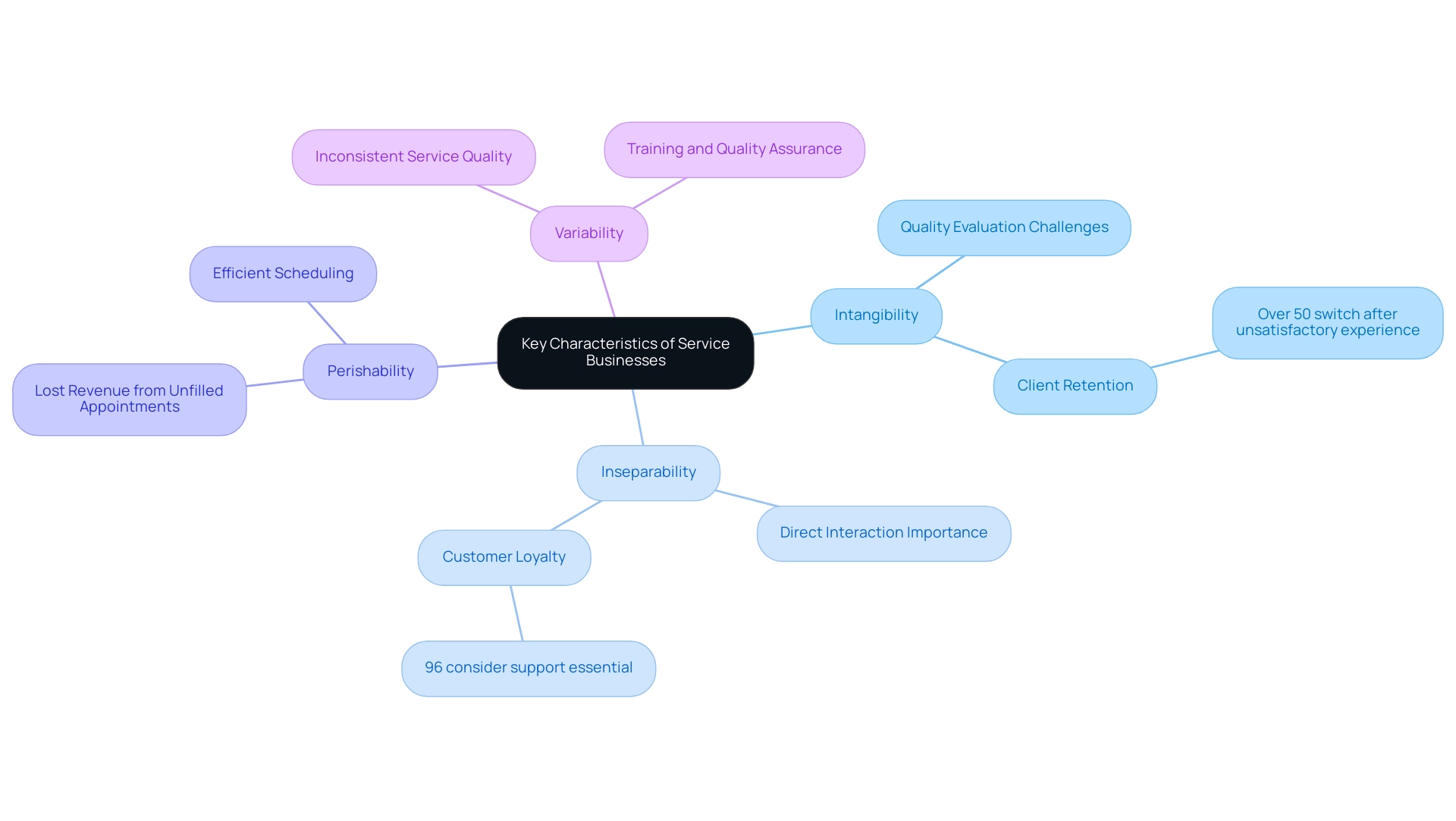
Types of Service Businesses: Examples and Categories
The service business definition encompasses various types of service enterprises, each with its own unique operational dynamics. These classifications include personal assistance, professional support, and commercial offerings.
Personal assistance directly serves individual consumers, featuring industries such as beauty salons, fitness trainers, and cleaning services. These enterprises focus on enhancing the personal well-being and satisfaction of their clients, often requiring a high degree of customer interaction and customization. It’s vital to recognize the emotional investment that clients place in these services, as they seek not just transactions but meaningful experiences that uplift their spirits.
On the other hand, professional offerings involve specialized expertise, covering sectors like legal, accounting, and consulting firms. These enterprises provide essential support to both individuals and organizations, tackling complex issues that require tailored solutions. The growing demand for professional assistance reflects the increasing intricacies of regulatory environments and the need for strategic guidance in various industries. This evolution can be daunting for many, highlighting the importance of having trusted partners who understand their unique challenges.
Commercial offerings represent another crucial category, including provisions that assist other enterprises in their operations. This encompasses IT support, marketing agencies, and logistics providers, all of which play a vital role in enhancing operational efficiency and driving growth for their clients. As companies increasingly rely on technology and specialized services, the market for commercial solutions is expanding rapidly, creating both opportunities and challenges for those involved.
Understanding the distinct challenges and client expectations within each category is essential for defining the service business landscape. For instance, personal care enterprises must prioritize client satisfaction and relationship-building, while professional offerings need to emphasize expertise and trust. In contrast, business operations often focus on efficiency and reliability to meet their clients’ needs. This nuanced understanding fosters a supportive environment where service providers can thrive.
As we look ahead to 2025, the business landscape continues to evolve, with trends pointing towards more personalized and technology-driven solutions. The recent decline in labor productivity, recorded at 2.4% in 2023 compared to 3.1% in 2022, underscores the urgency for providers to adapt their strategies to enhance efficiency and meet the changing needs of their clients. This adaptability is crucial for maintaining competitiveness in a market where customer expectations are continually rising.
Field Total, a home services management software, addresses many of the challenges contractors face. With dedicated support packages, Field Provisions offers tailored onboarding assistance, including data migration, account setup, and training specifically designed for contractors. As noted by Jeff Aroff from Legacy Maintenance, the platform provides “streamlined access to job-related information, emphasizing the platform’s effectiveness in enhancing productivity.”
By tackling issues such as miscommunication and inefficient scheduling, Field Empowerment enables contractors to improve their operational efficiency, allowing them to complete more jobs per technician and ultimately drive revenue growth. Moreover, with average hourly earnings steadily rising, organizations must leverage tools like Field Total to optimize their operations and adapt to the current economic landscape.
To learn more about our dedicated support packages and pricing, contact us today! Let Field Complete assist you in transforming your home services enterprise.
Common Challenges in Service Business Operations
The challenges faced by service businesses can be daunting, particularly when it comes to scheduling inefficiencies. Many contractors experience the frustration of misaligned schedules between technicians and clients, often leading to missed appointments and, ultimately, unhappy clients. This disconnect not only hampers timely service delivery but can also jeopardize long-term relationships with those clients who matter most.
Moreover, when communication falters, these scheduling issues only intensify. Misunderstandings about what clients expect can complicate interactions and diminish their overall experience. It’s important to remember that a staggering 93% of clients are likely to return to companies that provide a positive experience throughout their transactions. This statistic highlights just how crucial effective communication is in nurturing client loyalty.
As highlighted by Forrester, clients have a strong preference for knowledge bases over other self-service options, which underscores the urgent need for businesses to refine their communication strategies.
Effective client management is essential for any enterprise, as the service business definition emphasizes that high levels of client satisfaction are key to encouraging repeat business. By integrating robust management systems, like Field’s comprehensive contractor management software, organizations can significantly streamline their operations. This software enhances scheduling, invoicing, and real-time communication, ensuring that technicians are aligned with client expectations and project timelines.
In today’s landscape, as organizations increasingly turn to AI tools for client support, the importance of data protection and cybersecurity cannot be overstated. Over 90% of organizations report time and cost savings from these technologies, which not only boosts operational efficiency but also empowers providers to meet customer needs more effectively. Field Complete’s secure document storage and customizable workflows further enhance project and job management, making it easier for contractors to keep track of tasks and compliance.
As we look toward 2025, the operational challenges remain significant, with agent turnover rates exceeding 40% in some sectors, costing enterprises upwards of $2,500 for each lost agent. Addressing these challenges through improved scheduling methods and communication strategies, supported by Field’s user-friendly software, is crucial for enterprises striving to thrive in a competitive service business environment.
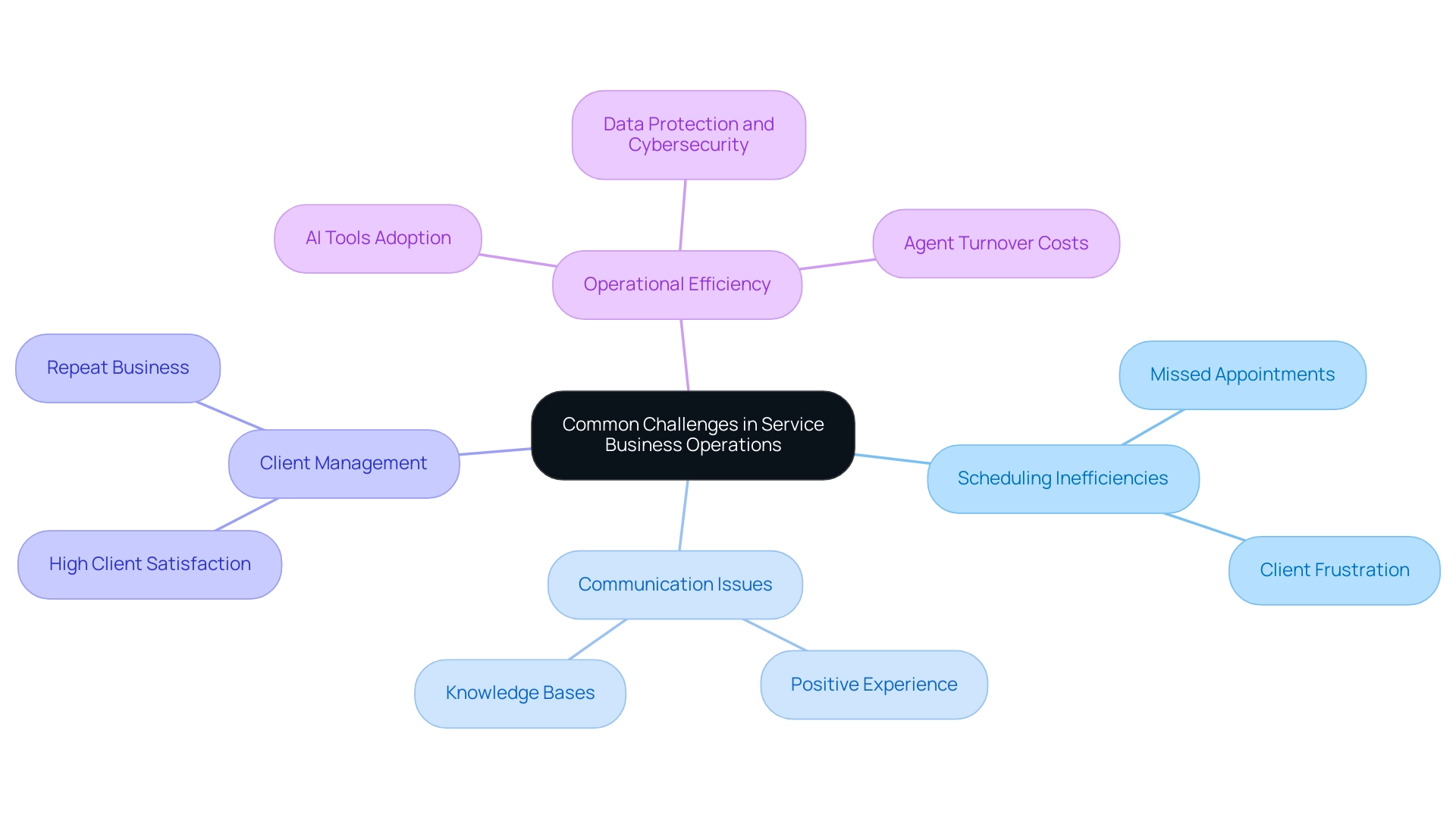
Leveraging Technology in Service Businesses
In today’s fast-paced operational sectors, technology stands as a vital cornerstone of efficiency, yet many contractors face significant challenges in navigating this landscape. The complexities of scheduling, invoicing, and customer communication can weigh heavily on providers, impacting both their workforce management and client interactions. Fortunately, software solutions like Field offer a compassionate response to these struggles, revolutionizing operations through automation and real-time management.
Imagine the relief of having a user-friendly interface that enables organizations to assign tasks with just a single click. Field’s effortless scheduling and dispatching features ensure that the right job is matched with the right technician, alleviating the pressure of miscommunication and inefficiencies. This ease of use is complemented by GPS tracking capabilities, which empower businesses to manage technicians effectively, optimize their routes, and significantly decrease travel time. By enhancing response rates and eliminating overbooking, contractors can prioritize their tasks with confidence.
Moreover, the mobile accessibility of Field Complete transforms the technician’s experience. With the ability to update job statuses and collect payments on-site, operational efficiency soars, leading to elevated customer satisfaction. The capability to monitor team locations in real-time ensures that technicians arrive at their destinations as planned, fostering reliability in service delivery. As commercial enterprises evolve, embracing technology is no longer a choice but a necessity for those wishing to thrive in a competitive market.
Statistics reveal that 75% of firms are poised to adopt advanced technologies like AI, big data, and cloud computing within the next five years. This urgency underscores the need for service providers to integrate solutions like Field, which directly address the challenges of digital transformation. These challenges—ranging from the complexity of the environment to a lack of technical expertise and high costs—highlight the importance of user-friendly solutions that simplify transitions for contractors.
Inspiring case studies illustrate that platforms such as Field Total not only enhance productivity but also empower companies to accomplish more tasks per technician, thereby driving revenue growth. As Jeff Aroff from Legacy Maintenance insightfully notes, “the streamlined access to job-related information significantly enhances productivity.” This statement reflects how Field facilitates access to vital information, reinforcing the software’s effectiveness in nurturing operational success.
Looking ahead to 2025 and beyond, the role of technology in operational enterprises will be pivotal, shaping strategies and customer engagement in ways we have yet to fully realize. By embracing such compassionate solutions, contractors can navigate the evolving landscape with confidence, ensuring they remain at the forefront of their industry.
The Role of Service Management Software: A Case Study on Field Complete
Field Complete stands as a testament to how management software can profoundly enhance operations for organizations. Many contractors face significant challenges, such as inefficient scheduling and communication issues, which can lead to stress and lost opportunities. With features like effortless scheduling and dispatching, real-time messaging, and on-site invoicing, Field Complete effectively addresses these prevalent concerns. The software’s advanced scheduling capabilities empower businesses to allocate resources more efficiently, significantly reducing downtime and maximizing productivity.
In an industry where every minute counts, this is especially vital. The real-time communication feature fosters seamless connectivity between technicians and office personnel, diminishing the chances of miscommunication—a common hurdle in management. Moreover, the ability to collect payments on-site not only streamlines cash flow but also enhances customer satisfaction, as clients appreciate the convenience of immediate transactions. Field’s rapid invoicing and in-app payment collection further simplify the financial aspects of contracting work.
Statistics underscore the growing importance of such software in the field management market, projected to reach around $8.06 billion by 2028. This growth mirrors a broader trend where companies prioritizing operational efficiency through technology are better positioned to thrive. For instance, organizations utilizing management software have reported notable operational improvements, including reduced administrative burdens and enhanced job tracking capabilities.
A poignant example is Black Angus, which successfully reduced after-hours assistance from 90% to 10% through endpoint automation, illustrating the tangible benefits of effective management software.
Field’s impact is further highlighted through user experiences, such as that of Matthew Miller, CEO of OnSite Mastery. He shared how Field’s offerings transformed field operations, noting that the comprehensive training and data-driven insights provided by the program led to improved performance and growth. Additionally, a significant majority of employees (65%) believe that self-service ITSM tools enhance their workplace experience, underscoring the importance of technology in boosting employee engagement and productivity.
By embracing management software like Field Complete, contractors can not only expect an increase in operational efficiency but also an enhancement in overall client support, positioning themselves for sustained growth in a competitive market. Moreover, the importance of improving employee experience through ITSM initiatives cannot be overlooked, as companies that focus on this aspect are more likely to experience higher employee retention and satisfaction.
Understanding the Target Audience: Contractors and Their Needs
Contractors face significant challenges in the service business landscape, and understanding their unique needs is essential for service providers who wish to build strong partnerships. These dedicated professionals often find themselves juggling multiple projects, striving for timely communication with clients, and maintaining high standards of customer satisfaction. The weight of these responsibilities can be overwhelming. To navigate these complexities, contractors need tools that simplify job management, enhance communication, and streamline invoicing processes.
Field Total recognizes these challenges and offers a range of onboarding packages tailored specifically for contractors. The Basic Onboarding Package is available for $199, the Premium Onboarding Package for $499, and the Pro Onboarding Package for $4999. Each package provides varying levels of support, from introductory calls and online demos to comprehensive on-site consultations and dedicated representatives. This flexibility allows contractors to select a package that aligns with their operational needs and budget, fostering a sense of empowerment.
The increasing demand for software solutions that offer real-time insights into job progress and resource allocation is evident. Many contractors grapple with project management issues, such as low productivity and skilled labor shortages, which can significantly impact their operational efficiency. Field Full addresses these specific needs by providing an affordable and straightforward solution designed with the contractor’s perspective in mind.
This approach automates routine tasks, reducing the need for extensive administrative support and enabling business owners to focus on growth and nurturing customer relationships.
Field Complete’s software includes essential features such as job scheduling, invoicing, and real-time communication, significantly enhancing a contractor’s ability to manage tasks effectively. The support options available in each onboarding package ensure that contractors receive the assistance they need to maximize their use of the software, reinforcing a sense of community and collaboration.
As Jeff Aroff from Legacy Maintenance shared, “The streamlined access to job-related information emphasizes the platform’s effectiveness in enhancing productivity.” As we look ahead to 2025, the landscape for contractors continues to evolve, highlighting the necessity for innovative solutions that meet their operational demands. Tools that facilitate seamless communication and provide comprehensive job management capabilities are not just helpful; they are essential.
By understanding and addressing the challenges faced by contractors, providers can enhance their offerings while contributing to the overall success of the contractors they assist. Together, we can create a supportive environment that empowers contractors to thrive.
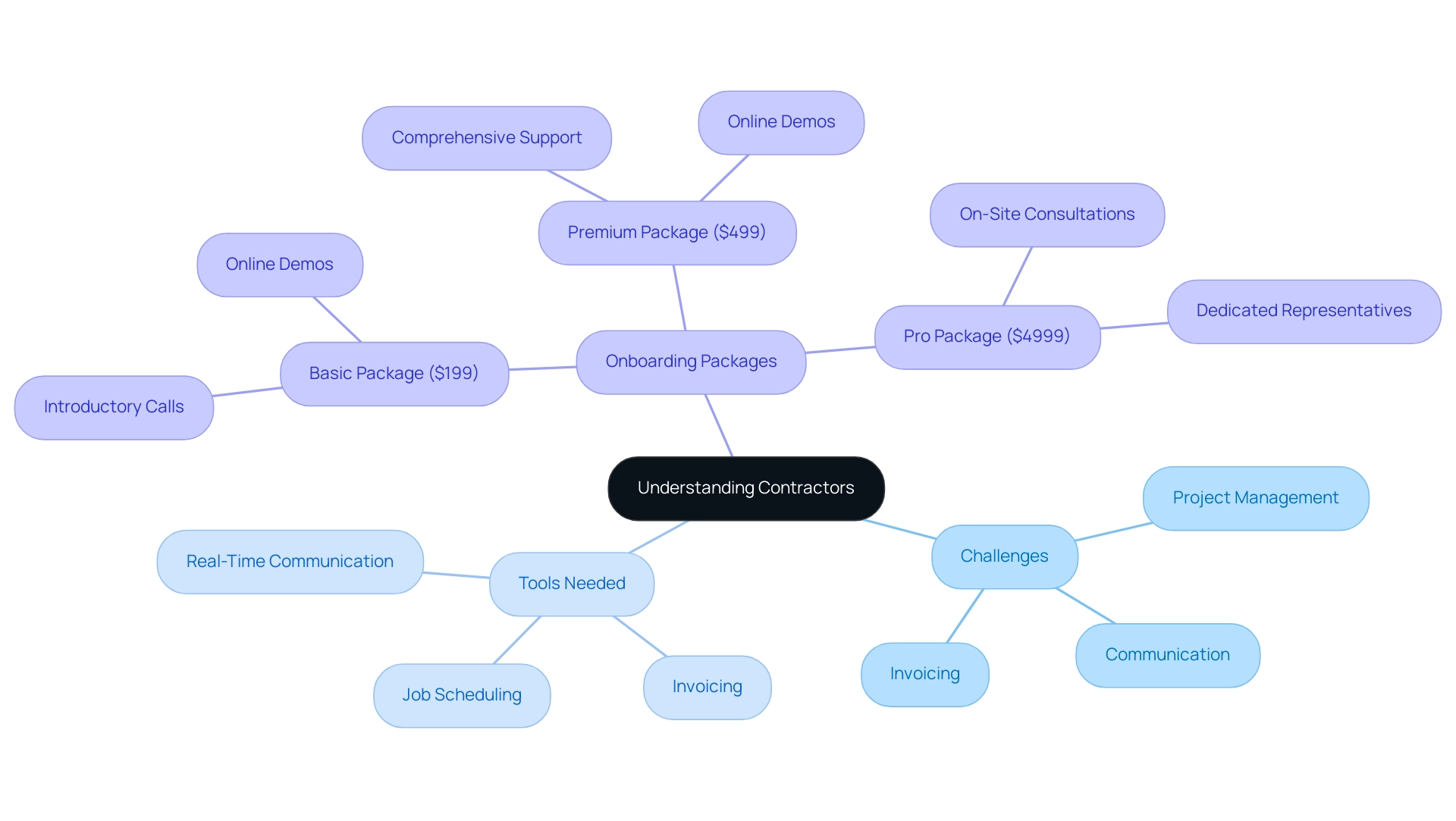
Key Takeaways: Understanding Service Businesses
Business operations are vital to the economy, primarily characterized by their provision of intangible products and services, as defined in the service business definition. These operations possess unique traits, including a strong reliance on client interactions and a commitment to consistent quality, which distinguish them from traditional goods-based industries. Recognizing these nuances is essential for success in this sector, especially for contractors who encounter specific challenges, such as scheduling inefficiencies and communication barriers.
The struggle to manage these challenges can feel overwhelming, yet the adoption of technology, particularly management software like Field Total, offers a promising path forward. This transformative tool enhances operational efficiency and boosts client satisfaction by streamlining processes such as job scheduling, invoicing, and real-time communication. Consequently, contractors can focus on delivering quality work rather than becoming mired in administrative tasks. As Jeff Aroff from Legacy Maintenance shared, “The streamlined access to job-related information emphasizes the platform’s effectiveness in enhancing productivity.”
This integration of technology not only elevates productivity but also empowers organizations to respond promptly to customer needs, a crucial aspect of understanding the service business definition in today’s competitive landscape.
Furthermore, grasping operations in this sector is underscored by the significance of attached rates in field management. A mere 5% increase in the attach rate can lead to substantial revenue growth, highlighting the importance for contractors to concentrate on maximizing their contracts. By leveraging Field Total’s comprehensive field management software, contractors can enhance their profitability while streamlining their operations.
Additionally, Matthew Miller, CEO of OnSite Mastery, reflects, “Field Elevated our field ops, but implementation required more than purchasing it.” This insight underscores the role of the success team, which provided comprehensive training and data-driven insights that resulted in improved performance and growth. Such testimonials highlight the transformative impact of Field Complete’s customer success offerings on field operations, reinforcing the value of investing in technology that truly supports contractors.
As enterprises evolve, those who effectively harness technology are more likely to thrive, adapting to the changing demands of their customers. Statistics reveal that sectors like healthcare and social assistance enjoy the highest survival rates due to a steady demand for their services. This trend emphasizes the necessity for organizations to remain agile and responsive to market conditions.
By acknowledging and addressing the specific needs of their target audience, contractors can effectively define their service business definition, tailoring their offerings to meet market demands and ensuring long-term success in this dynamic industry. Additionally, the generational gap in business ownership, with Millennials owning only 13% of small businesses, signals a shifting landscape that contractors must navigate as they adapt to new market realities. Fill out the form to watch a demo of Field Complete and discover how it can transform your service management today.
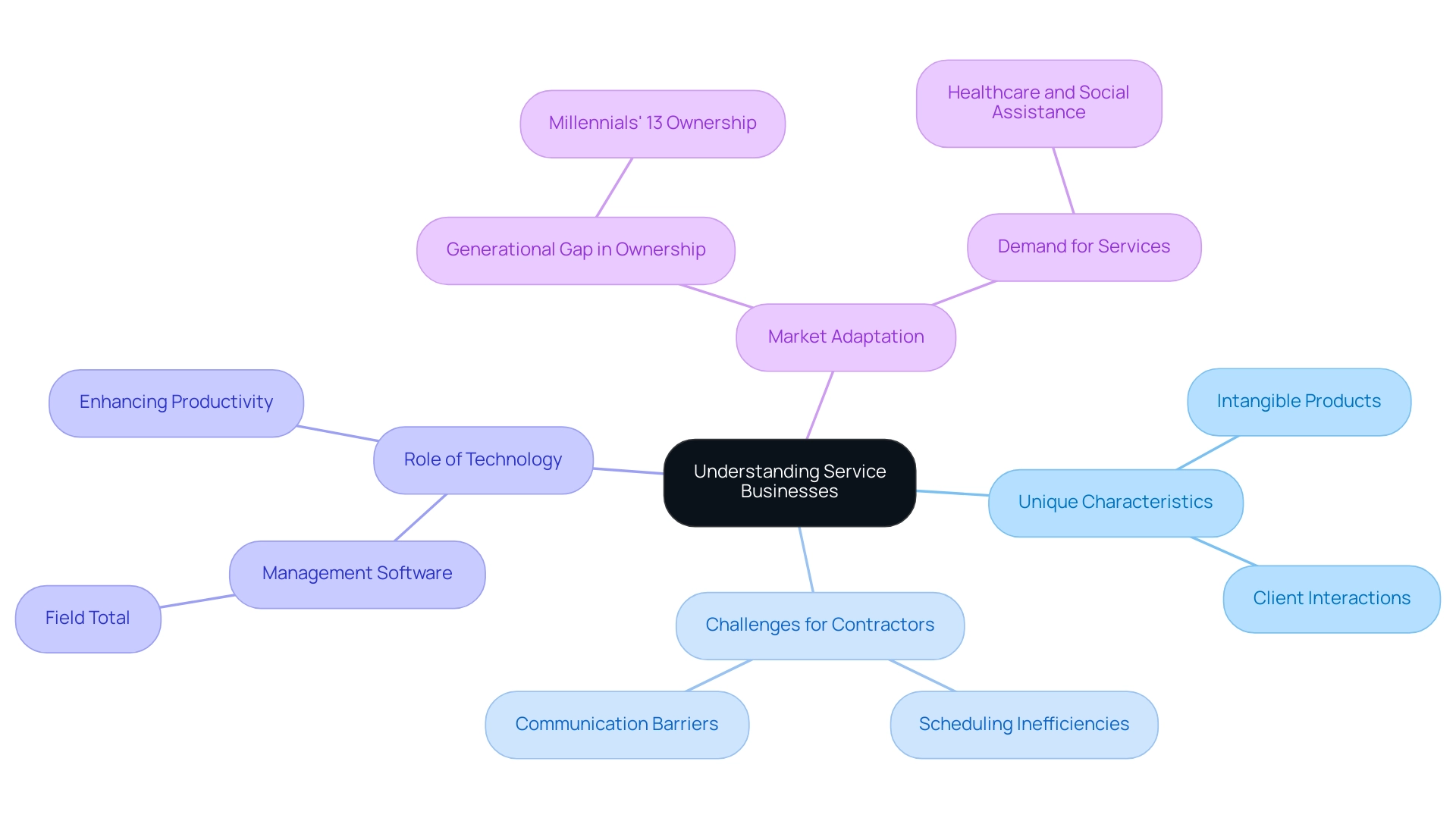
Conclusion
Service businesses are uniquely positioned in today’s economy, facing the daunting task of delivering intangible products while navigating the critical importance of customer interactions. The challenges they encounter, from scheduling inefficiencies to communication barriers, can feel overwhelming, highlighting the urgent need for effective management solutions that not only enhance operational performance but also foster customer satisfaction.
The integration of technology, particularly through service management software like Field Complete, has proven to be a transformative ally. By streamlining essential processes such as job scheduling, invoicing, and real-time communication, contractors can shift their focus back to delivering exceptional service rather than being bogged down by administrative tasks. This shift not only boosts productivity but also empowers businesses to respond promptly to customer needs, reinforcing their competitive edge in a challenging marketplace.
Understanding the dynamics of service businesses is crucial, especially the significance of attached rates in driving revenue growth. Contractors aiming to optimize their operations will find that testimonials from industry leaders underscore the vital role of comprehensive training and support services in successfully implementing these technological solutions. These stories reflect the relief and satisfaction that come from embracing change and utilizing the right tools.
As the landscape of service businesses continues to evolve, it becomes paramount to embrace technology and prioritize customer satisfaction. By adapting to the changing demands of their clientele and leveraging effective management tools, contractors can position themselves for sustained growth and success in an increasingly competitive environment. Together, we can navigate these challenges and build a brighter future for service businesses, one where technology and customer care go hand in hand.
Frequently Asked Questions
What is a service business?
A service business is an organization that provides intangible offerings, primarily assistance, to clients in exchange for compensation, focusing on delivering expertise, labor, or professional services rather than tangible products.
How does client satisfaction impact service businesses?
Client satisfaction is crucial for service businesses; studies show that over 50% of clients will seek a competitor after a single unsatisfactory experience, highlighting the importance of effective support.
What role does technology play in modern service businesses?
Technology integration has transformed business operations, with high-performing organizations increasingly adopting self-service options. Research indicates that 61% of users prefer these solutions for resolving straightforward issues, enhancing client satisfaction and allowing support agents to focus on more complex problems.
How can organizations improve client interactions?
Organizations can improve client interactions by implementing self-service alternatives, which empower support agents to concentrate on intricate challenges, resulting in superior quality and an enriched client experience.
What are the key characteristics that define a service business?
The key characteristics of a service business include intangibility, inseparability, perishability, and variability, each posing unique challenges for service providers.
How does intangibility affect service delivery?
Intangibility means that service offerings cannot be physically observed or touched before acquisition, complicating clients’ ability to evaluate quality, which is vital for success.
What is inseparability in the context of service businesses?
Inseparability refers to the simultaneous production and consumption of services, necessitating direct interaction between providers and clients, which is crucial for creating a positive customer experience.
What challenges does perishability present for service businesses?
Perishability indicates that intangible offerings cannot be stored for future use, leading to lost revenue if demand is not managed effectively, such as unfilled appointments.
How does variability impact service quality?
Variability highlights that service quality can fluctuate based on factors like employee performance and client interactions, making it essential for businesses to implement robust training and quality assurance measures.
Why is personalized support important for service businesses?
Personalized support enhances client experiences and fosters loyalty, leading to significant revenue increases. Companies emphasizing personalized assistance can improve retention rates, which is crucial for success in the industry.
How can HVAC contractors leverage technology for better operations?
HVAC contractors can use tools like Field Complete to enhance operational efficiency, streamline scheduling, estimating, and payment collection, and improve client satisfaction by managing the unique challenges posed by their intangible offerings.





